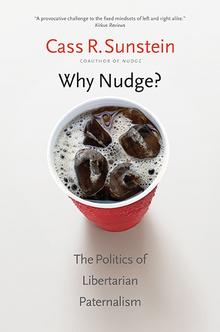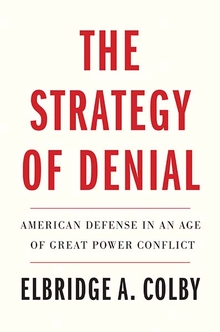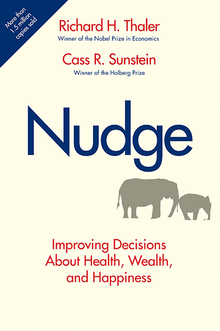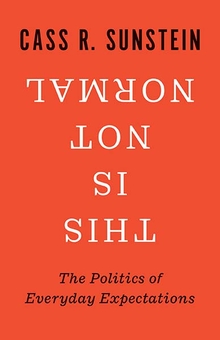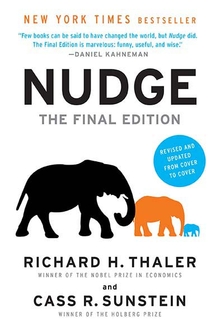Why Nudge?
WARNING
You are viewing an older version of the Yalebooks website. Please visit out new website with more updated information and a better user experience: https://www.yalebooks.com
The Politics of Libertarian Paternalism
Cass R. Sunstein
The bestselling author of Simpler offers a powerful, provocative, and convincing argument for protecting people from their own mistakes
Based on a series of pathbreaking lectures given at Yale University in 2012, this powerful, thought-provoking work by national best-selling author Cass R. Sunstein combines legal theory with behavioral economics to make a fresh argument about the legitimate scope of government, bearing on obesity, smoking, distracted driving, health care, food safety, and other highly volatile, high-profile public issues. Behavioral economists have established that people often make decisions that run counter to their best interests—producing what Sunstein describes as “behavioral market failures.” Sometimes we disregard the long term; sometimes we are unrealistically optimistic; sometimes we do not see what is in front of us. With this evidence in mind, Sunstein argues for a new form of paternalism, one that protects people against serious errors but also recognizes the risk of government overreaching and usually preserves freedom of choice.
Against those who reject paternalism of any kind, Sunstein shows that “choice architecture”—government-imposed structures that affect our choices—is inevitable, and hence that a form of paternalism cannot be avoided. He urges that there are profoundly moral reasons to ensure that choice architecture is helpful rather than harmful—and that it makes people’s lives better and longer.
Based on a series of pathbreaking lectures given at Yale University in 2012, this powerful, thought-provoking work by national best-selling author Cass R. Sunstein combines legal theory with behavioral economics to make a fresh argument about the legitimate scope of government, bearing on obesity, smoking, distracted driving, health care, food safety, and other highly volatile, high-profile public issues. Behavioral economists have established that people often make decisions that run counter to their best interests—producing what Sunstein describes as “behavioral market failures.” Sometimes we disregard the long term; sometimes we are unrealistically optimistic; sometimes we do not see what is in front of us. With this evidence in mind, Sunstein argues for a new form of paternalism, one that protects people against serious errors but also recognizes the risk of government overreaching and usually preserves freedom of choice.
Against those who reject paternalism of any kind, Sunstein shows that “choice architecture”—government-imposed structures that affect our choices—is inevitable, and hence that a form of paternalism cannot be avoided. He urges that there are profoundly moral reasons to ensure that choice architecture is helpful rather than harmful—and that it makes people’s lives better and longer.
Cass R. Sunstein, the Robert Walmsley University Professor at Harvard University, is the author of several books, including Simpler: The Future of Government and, with coauthor Richard H. Thaler, Nudge: Improving Decisions About Health, Wealth, and Happiness. He lives in Cambridge, MA.
"An engaging and insightful tour through the evidence that most human beings don't make decisions in the way often characterized in elementary economics textbooks, along with a rich array of suggestions for enabling many of us to make better choices, both for ourselves and for society. . . . Common sense at its best."—Benjamin M. Friedman, New York Times Book Review on Nudge
"While we tend to think that offering information merely allows us to choose our means more carefully, without affecting what ends we actually want to pursue, Sunstein argues quite convincingly that for that government to highlight certain information may actually affect our goals."—Sarah Conly, author of Against Autonomy: Justifying Coercive Paternalism
"A provocative challenge to the fixed mindsets of left and right alike."—Kirkus Reviews
ISBN: 9780300212693
Publication Date: April 28, 2015
Publication Date: April 28, 2015
208 pages, 5-1/2 x 8-1/4
3 b/w illus.
3 b/w illus.

